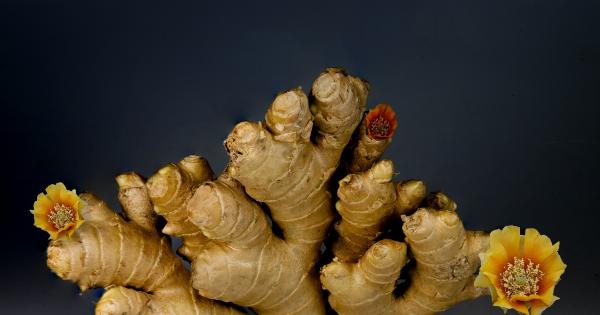Ginger, scientifically known as Zingiber officinale, is a tropical flowering plant that has been used for centuries in various culinary and medicinal applications. It belongs to the Zingiberaceae family and has a unique spicy and aromatic flavor.
History and origins of Ginger
Ginger is believed to have originated in Southeast Asia and is now cultivated in many parts of the world, including India, China, and Jamaica. It has been used extensively in traditional Ayurvedic and Chinese medicine for its numerous health benefits.
Culinary uses of Ginger
In the culinary world, ginger is a popular spice that adds a delightful element to many dishes. It is commonly used in both sweet and savory recipes, as well as in beverages. Here are a few examples of how ginger can be incorporated into various dishes:.
Ginger in traditional medicine
In addition to its culinary uses, ginger has been used for centuries in traditional medicine systems such as Ayurveda and traditional Chinese medicine.
It is considered a natural remedy for a wide range of health conditions due to its powerful medicinal properties.
Health benefits of Ginger
Ginger is known for its wide array of health benefits. Let’s explore some of the most notable ones:.
1. Digestive aid
Ginger has been used for centuries to alleviate digestive issues such as nausea, indigestion, and bloating. It helps by increasing digestive enzyme activity and promoting the movement of food through the digestive system.
2. Anti-inflammatory properties
Ginger contains potent anti-inflammatory compounds called gingerols, which can help reduce inflammation in the body. This makes it beneficial for managing conditions such as osteoarthritis, rheumatoid arthritis, and other inflammatory disorders.
3. Immune system booster
With its antimicrobial and antioxidant properties, ginger can strengthen the immune system and protect against infections. It aids in fighting off colds, flu, and other respiratory infections.
4. Relieves menstrual discomfort
Women experiencing menstrual pain or discomfort can find relief through ginger. Its natural compounds help reduce cramps and alleviate other symptoms associated with menstruation.
5. Anti-nausea effects
Ginger is well-known for its ability to combat nausea and vomiting, including morning sickness during pregnancy and nausea induced by chemotherapy or post-surgery. It is a safe and effective natural remedy for managing these conditions.
6. Blood sugar regulation
Research suggests that ginger may help regulate blood sugar levels by improving insulin sensitivity. This makes it beneficial for individuals with diabetes or those at risk of developing the condition.
7. May aid in weight management
Ginger has been found to have properties that can help boost metabolism and reduce appetite, potentially aiding in weight management. However, more research is needed to fully understand its effects on weight loss.
8. Promotes cardiovascular health
Ginger has been shown to have positive effects on heart health by lowering blood pressure, reducing bad cholesterol levels, and preventing blood clot formation. These properties contribute to a healthier cardiovascular system.
9. Potential cancer-fighting properties
Some studies suggest that ginger may have anti-cancer properties, specifically against certain types of cancer cells. However, further research is required to determine its full potential in cancer prevention and treatment.
10. Antioxidant effects
Ginger is rich in antioxidants, which help protect the body against oxidative stress and damage caused by free radicals. These antioxidants can contribute to overall health and may help prevent chronic diseases.
Incorporating Ginger into your diet
Now that you are aware of the many health benefits of ginger, here are some easy ways to incorporate it into your daily diet:.
1. Ginger tea
One of the simplest ways to enjoy the benefits of ginger is by brewing a cup of ginger tea. Simply steep fresh ginger slices in hot water and enjoy it plain or with a touch of honey and lemon.
2. Ginger-infused water
Add a few slices of ginger to your water bottle and let it infuse for a refreshing and flavorful twist. This is a great option if you prefer a milder ginger taste.
3. Spice up your meals
Add grated or minced ginger to your stir-fries, curries, soups, or marinades for an extra kick of flavor and health benefits.
4. Ginger smoothies
Add a small piece of fresh ginger to your favorite smoothie recipe for added flavor and a nutritional boost.
5. Ginger in baked goods
Experiment with using ginger in baked goods like gingerbread cookies, cakes, or muffins to infuse them with its unique spicy flavor.
6. Ginger in salads and dressings
Add grated ginger to your salad dressings or sprinkle it over your greens for a zesty and refreshing twist.
7. Ginger in sauces and marinades
Include ginger in your homemade sauces, marinades, and dips to enhance the flavor profile and benefit from its medicinal properties.
8. Pickled ginger
Enjoy pickled ginger with sushi or as a palate cleanser between different sushi rolls. Pickled ginger provides a tangy and refreshing taste.
9. Ginger desserts
Try incorporating ginger into desserts like ginger cookies, gingerbread, or ginger-infused ice cream for a delightful and aromatic treat.
Safety and precautions
While ginger is generally safe for consumption, it is important to exercise caution, especially in certain circumstances:.
1. If you are taking blood-thinning medications, such as warfarin, consult your healthcare provider before consuming large amounts of ginger, as it may increase the risk of bleeding. 2. Pregnant women should consult their healthcare provider before consuming ginger supplements or extracts, as high doses may interfere with pregnancy. 3. Ginger may interact with certain medications, so it is essential to consult your healthcare provider if you are taking any medications before incorporating ginger into your diet regularly.Conclusion
Ginger is truly a versatile and powerful superfood with an array of health benefits.
Incorporating this aromatic spice into your daily diet can enhance both the flavor and nutritional value of various dishes while potentially improving your overall well-being. Whether used in culinary applications or as a natural remedy, ginger has proven itself as a valuable asset to human health for centuries.






























